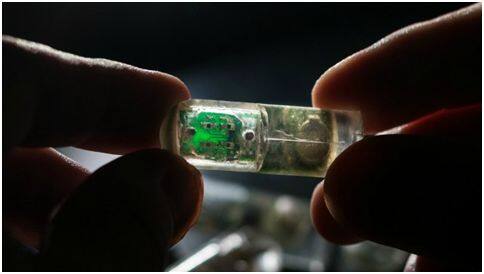In a new study, researchers from the Massachusetts Institute of Technology, Massachusetts General Hospital, Harvard Medical School, and Brigham and Women's Hospital developed a swallowable capsule containing tiny electronic devices. This capsule is equipped with microelectronics and millions of genetically engineered bacteria, It may one day be used to observe health problems from inside the intestines. The results of the study were published in the Science Journal on May 26, 2018, entitled "An ingestible bacterial-electronic system to monitor gastrointestinal health."
The researchers reported that the capsule had been tested on pigs and correctly detected signs of bleeding. The capsules are more than one inch in length and need to be smaller in order to be tested in the human body. However, these findings suggest that the capsules can eventually be used to detect signs of ulcers, inflammatory bowel disease and even colon cancer in humans.

A biosensor that can be swallowed, pictured by Lillie Paquette, MIT.
This is the latest development in the growing field of sensors that can be swallowed or worn to monitor our health. Pills equipped with cameras, thermometers and pH meters have been used to find diseases and track digestion. Last year, a psychotropic drug that reminded doctors when to take it was approved by the United States. A paste-type skin monitor for the recovery of stroke patients is under development.
Kourosh Kalantar-zadeh, co-author of the paper, said that this is the first time MIT has used engineered bacterial cells as sensors in swallowable capsules. He is developing a gas-sensing all-electronic pill at the Royal Melbourne Institute of Technology in Australia.
Kalantar-zadeh said, “This research is another step towards the great promise of smart ingestible capsules.”
The researchers tested the capsules with a harmless strain of E. coli. They genetically modified the bacterial cells with DNA from other bacteria, allowing them to detect the compound heme, followed by luminescence. The electronic device in the capsule then transmits this light signal to the smartphone.
Phillip Nadeau, co-author of the paper, said that by combining the three electronic chips of the capsule, it is possible to reduce it to a normal pill size. Mark Mimee, co-first author of the paper, said that in order to protect the privacy of patients, the data needs to be encrypted, and it is used once, so need to make it reusable..
As the laboratory discovers DNA with new detection capabilities, the capsule may be customized to diagnose multiple diseases. The paper's co-communication author Tim Lu speculates that future patients may swallow capsules "once a week or once a month" to screen for early signs of cancer without colonoscopy.
Dr. Stephanie Hansel of the Mayo Clinic in the United States (not participating in the study) said that the capsule may help doctors monitor the hard-to-reach parts of the small intestine of patients with Crohn's disease or study the normal balance of microbes in the intestine.
Refer:
Mark Mimee1,2,*, Phillip Nadeau3,*,†, Alison Hayward et al. An ingestible bacterial-electronic system to monitor gastrointestinal health. Science, 25 May 2018, 360(6391):915-918, doi:10.1126/science .aas9315
Peter R. Gibson, Rebecca E. Burgell. Illuminating dark depths. Science, 25 May 2018, 360(6391): 856-857, doi:10.1126/science.aat8658


